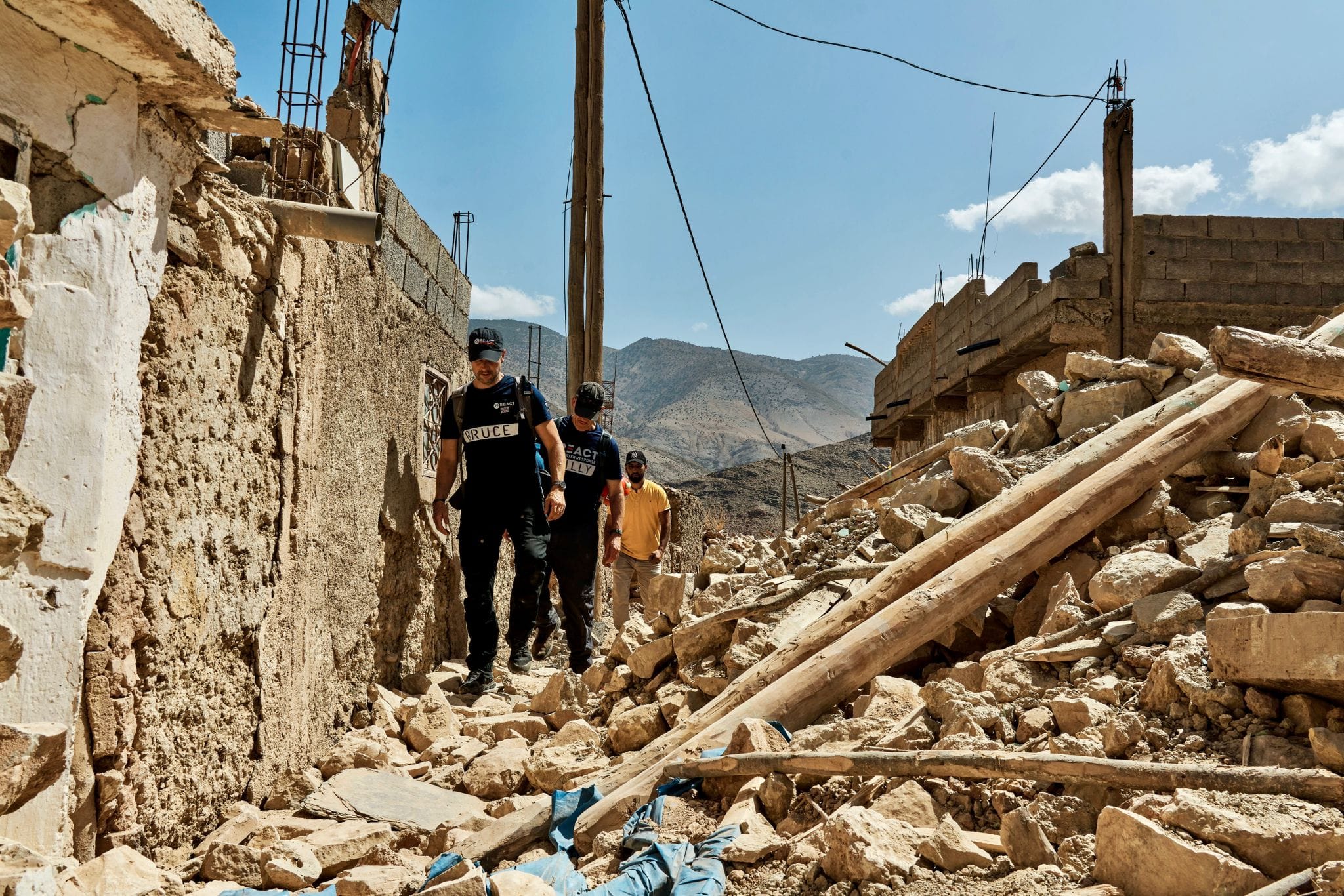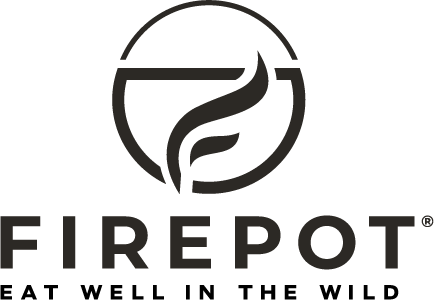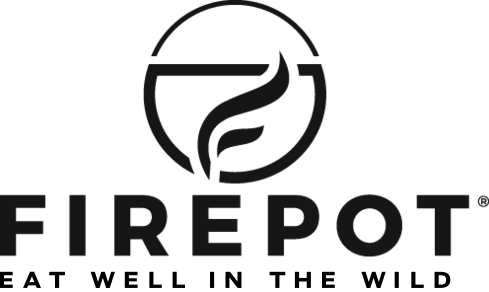
REACT Disaster Response
REACT is a UK-based charity, with a West Country base close to Firepot. REACT's teams of highly trained volunteer Responders are well known for their rapid deployment to global disasters and other humanitarian crises.

Earlier this year, REACT deployed three teams of Responders to Morocco in the wake of the 6.8 magnitude earthquake that struck the High Atlas Mountains. The volunteers were able to meet the immediate needs of people affected, including the provision of shelter and medical assistance in hard-to-reach villages.
In 2022, REACT began distributing critical supplies to over 94,000 people displaced as a result of the conflict in Ukraine. Their work has continued since then, supporting partner organisations with the provision and distribution of over 1,000,000 meals. The next phase of this operation is set to deploy in the next week, when a team of Responders will depart for areas close to the frontline, to deliver essential incident management training, with a focus on trauma medicine.
The following is extracted from an interview written by Alex Whitty with Paul Taylor, REACT’s International Operations Manager. They discuss the processes and preparation that surround emergency response.
You’re the first person REACT sends as soon as a disaster strikes so you need to be ready – do you always keep a bag packed?
I’ve always got a bag packed with the essential kit I need to go anywhere. The most important item is a fully charged satellite phone for comms, and then a Garmin tracker so the team at HQ can track my location, which also sends text messages. Then a water bottle with a purifier and a few ration packs. I take eco-friendly soap which I can use in rivers and doubles-up for washing my clothes. I also take a medical kit, toothbrush, toothpaste, small roll-on deodorant, a small travel towel and a small sleeping bag – that often comes in handy before I’ve even arrived in country because I can be waiting for hours in airports for connecting flights. The majority of our deployments are to hot climates, so I don’t take a lot of clothing. I’ve always got a pair of robust trousers with big pockets for maps etc., a pair of lightweight hiking boots, a couple of REACT t-shirts, a safari shirt for super-hot temperatures, cargo shorts, closed-toed sandals, a brimmed hat and sunglasses. And then three pairs of socks and three pairs of underwear – one to wear, one to wash and dry and one as emergency back up!
Bag’s packed. What else do you do to get yourself prepared?
The Operations Team at our HQ in Chilmark is constantly monitoring and assessing threats and emerging situations. Over the years we’ve built up a good network of international humanitarian contacts and they’re often our first sources of information but we can’t know everything and much of my responsibility and that of the response teams that follow, is to build that situational awareness and help develop a common operating picture. Every crisis, every disaster, is different. You can’t prepare for the unknown but you need to be comfortable with that – that’s your preparation. You have to rely on your training and your experience and trust the team around you. That’s what REACT does. We don’t prepare for one thing – we prepare for anything. We’re known for our agility, resilience and flexibility so we can adapt and respond to situations and needs as they emerge, whatever they may be.
What do you do when you first land?
Soon as you disembark, and from the air before you land, you’re surveying and assessing, building up atmospherics, getting a feel for the situation and the environment you’re in. You run on instinct – I’m a big believer in tuning yourself in and getting a feel for a place and its people. Our first practical task is to gain access. Sometimes there can be lots of politics at play, people with agendas you’ve got to negotiate your way around. Much of the time it comes from a good place, people wanting to help but not knowing how. We help to unlock that, managing situations, understanding and assessing needs, and collaborating to find solutions. It requires lots of meetings, liaison and emotional intelligence but that’s where our training and experience comes in.
Wouldn’t it be better to send more of you in that first response?
No. We wouldn’t be as effective. Our response teams follow rapidly but we’re only going to deploy them if there’s a need for them to go. A small team means less kit and less of a burden on local infrastructure, so we can be self-sustaining and move fast, and we’re better placed to navigate through the challenges of the immediate aftermath of a disaster. We’ve got to say with conviction that we’re going to send back a plan to supplement the humanitarian effort and we’re not just flag planting. We’re not just saying we’re a disaster response charity and we’re in Indonesia; we’re saying we’ve sent our team forward because we’ve got a proven capability that is going to have an effect on people’s lives in the wake of this disaster.
It must be challenging to witness so much devastation and suffering. How do you deal with that and ensure you’re able to effectively do your job?
You focus on the people you’re there to help. We’re present during people’s darkest hour, witnessing immense suffering. When you’re in that environment, seeing it at close hand, you experience a human connection at its most basic, primal level – someone is in distress and you can help them. It focuses you. You want them to know and understand that you’re there with them and alongside them, that they’re not facing this alone. You’re not going to allow them to suffer, you’re going to do something; you’re going to act. Sometimes it can feel overwhelming and you might feel powerless, you might get frustrated, because you can’t immediately solve their problem. I have learnt to identify those frustrations as a normal human reaction but then park them. The best way to help those in need is with a clear head and to think objectively.

When you’re in the immediate aftermath of disaster and its chaos, where do you start?
I always say the way to solve a big problem is through a number of smaller solutions. And you’re often one of those smaller solutions. If you can help one person during that day then that’s someone who might not have received any help if you hadn’t deployed. You start somewhere and eventually it will grow and have an impact. It’s a huge privilege to be in a position where you’re able to help people and your actions significantly impact the quality of their lives, and I don’t take that lightly. To me, being a humanitarian is about being a decent human being. You help the people you can, wherever you are. When you do that in these situations, it means saving lives. It’s always hard to witness suffering but you take comfort in doing something about it. In Lombok, after the 2018 earthquake, as I was walking amongst the rubble, assessing the devastation, a local man approached me and asked where I’d come from. I said I’d come from the UK. He asked me why and I told him I’d come to help. He said he thought they’d been forgotten. Those are the people you’re there for and they’re the moments that lift you.
Your job puts you in some dangerous situations, do you feel that sense of danger?
There are risks we take but we all accept that we have to. We do this because our instinct is to help people in crisis and you can’t do that from a safe, comfortable position. If we’re not prepared to put ourselves in those situations where we can help people, what’s the point of us being there? We’re trained and experienced, many of us are ex-military. That’s why we’re a bit different and why we’re more comfortable with accepting greater risk than maybe other charities are. We haven’t lived through the experience that the survivors have, we get there in the aftermath, although that can still be very dangerous. After the earthquake in Nepal in 2015, we were in Kathmandu loading a vehicle to go to Gorkha, which was the epicentre of the first earthquake. The ground started shaking and there was a deafening roar for about thirty seconds. The buildings around us started to collapse. We ran down the road to get out of the footfall of the collapsing buildings. The tarmac road that we were on was going up and down like a wave machine for about 10 minutes. Those situations give you a real feeling of how insignificant you are. Even in the military, there are actions you can take and mitigation you can put in place for potential dangers. But when it’s something of that magnitude, while there is evasive action you can take, you are completely at the mercy of mother nature.
How do you keep up morale?
Morale’s never been a problem when I’ve deployed. We’re a close-knit team and we’re all motivated and passionate about why we’re there. It can be exhausting and that takes its toll but we keep each other’s spirits up, we talk and we share things when we need to.
Going back to when you first arrive in a country, is there a coordinated way for international responders to meet each other or is it a case of making yourself known?
It’s both. In big disasters, you’ll always see the UNOCHA [UN Office for the Coordination of Humanitarian Affairs], a team from UNDAC [Disaster Assessment and Coordination], the World Food Programme, UNICEF, Médecins Sans Frontières, and World Central Kitchen, who help feed people affected as well as the staff of NGOs. You fit into that ecosystem. You build little networks with people who look out for you. I often get WhatsApp messages from contacts from other charities asking if I’ve deployed. You could say there are two networks. There is the official network which is predominantly the UN which supports the national government and their disaster management agency. Then there are also subsidiary informal networks which are much quicker, which can be formed by locals. If you’re in a part of the world where there is lots of bureaucracy at play that can slow things down, so people navigate that by setting up smaller groups. On that group you might communicate something like ‘I need to deliver food, can anyone help me out with a vehicle’ and they reply in 10 seconds: ‘You should speak to this guy because he’s renting out vehicles’. There are always those two layers to disaster response and they’re both effective for different reasons. The two keys to it all are trust and collaboration. Really they go hand-in-hand. One of our values at REACT is ‘trust and be trustworthy’ which means you have to intuitively trust people and demonstrate that and when you do, you’ll earn their trust back, and that makes everything easier and you start pooling your knowledge and resources together.”
Collaboration is one of those buzzwords that gets thrown about a lot, what does it mean to you, especially in a humanitarian context?
In disaster response, everything you do is a race against the clock. The consequences of the decisions you make can directly impact people’s lives and making decisions in isolation is a sure way to make mistakes that could be fatal. You have to make the most of all available resources and gather as much information as you possibly can so you can make informed decisions. Always seek advice and consider it a sign of wisdom, not weakness.

We’ve touched on your military and your humanitarian experience, what lessons have you learned that apply to both?
In the military, there’s a more directive style of leadership. That doesn’t tend to be the same style in the humanitarian sector but there are definitely moments when it’s needed in disaster response, when you’re at risk from secondary hazards or emergent earthquakes, tsunamis and hurricanes. When the ground starts shaking my experience is that the team will look you in the eye and you feel this is the ‘big leadership moment’. They may be scared and you probably are too. What they want is clear, unambiguous direction which is going to lead them to safety. That’s when those military leadership skills come in. The more experienced I’ve become, the more I’ve seen the clear advantage of letting go of the reins and giving my team the freedom to manoeuvre. Tell someone what to do but not how to do it. At REACT, we’re always problem-solving and adapting. You won’t get that same ability by following a strict approach. Again, it comes down to trust and collaboration. Stay focused on the mission and rely on each other. People are depending on you to do just that.
Please read, share and follow on REACT's Facebook and Instagram pages, as they give updates on this latest response. REACT is an important charity — and one to consider for anyone looking for new beneficiaries to a fundraising expedition.
In the field, REACT personnel use Firepot meals — hot, nutritionally balanced meals which just need hot water, reducing demand on local resources in times of crises.
Publication date: 21 November 2023

